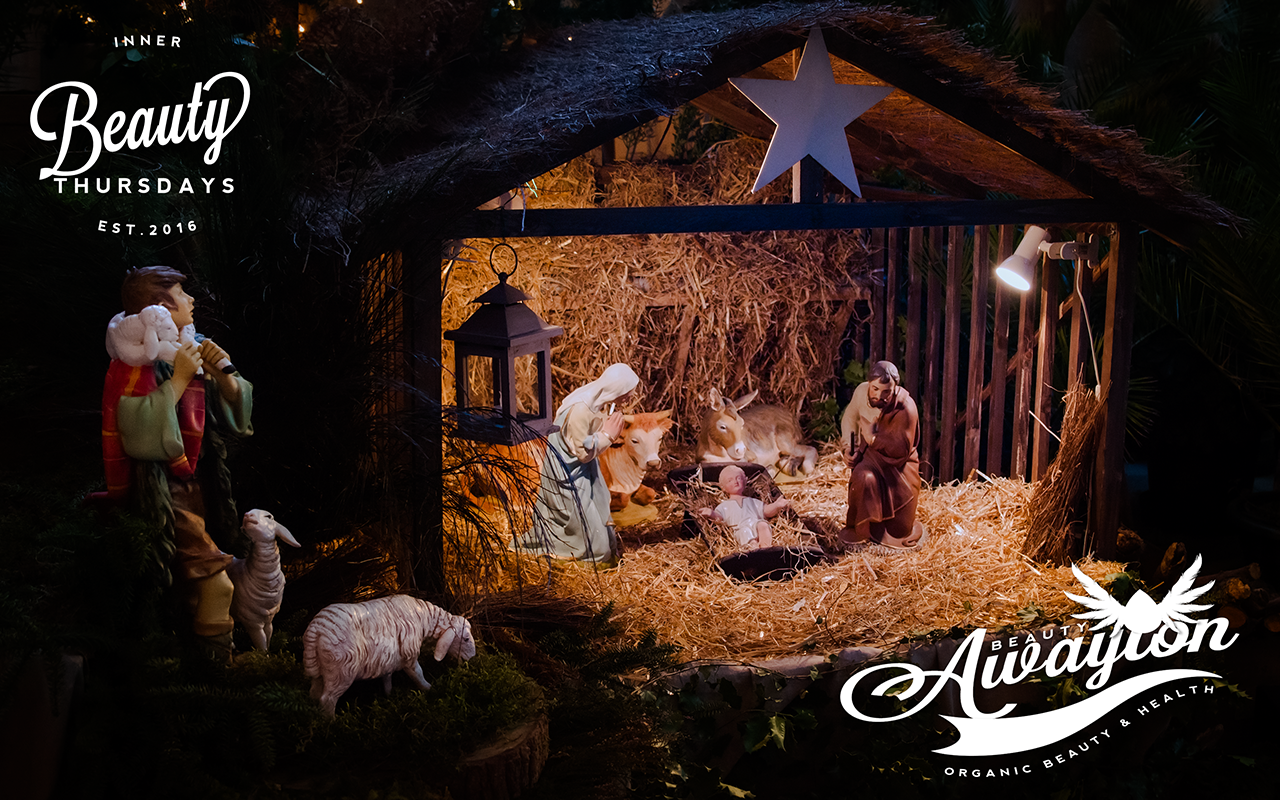So someone told you Christmas is pagan, right? – See this | AWAYION BEAUTY
Hi, Friends!
Are our modern Christmas traditions really of pagan origin? Has some passionate pastor, a charismatic YouTube Evangelist, a persuasive Discord influencer, or an assertive keyboard warrior ever approached you, their words echoing through the air, as they declared there are pagan origins of our cherished modern Christmas traditions? Could you almost see the intensity in their words as they labeled you a heathen or proclaimed you as “not good” simply for partaking in these beloved festivities?
Well, what if you discovered historical facts, as well as evidence from the original language of the historical Bible that prove otherwise? Fancy, eh?
Get ready, because this revelation is about to blow your mind.
So what are the deets on Christmas? Is it pagan?
Discover if virtually all the modern Christmas traditions are really pagan, in this post. Because every girl in Christ should know.
Super Awesome Side Note: Before we start, understand we will not claim contested truths. And we will refrain from falling into the trap of “teaching man-made ideas as commands from the Creator.”
Out of respect for believers, we will simply acknowledge the multiplicity of views on this subject (the keyword is “acknowledge” and not agree). So, always do further research.
Super Psst… the big secret I’ve been hinting around on social media for a few months now – is revealed… (it’s why I have been MIA for a bit…). Read on after this post for the juicy details.
*Disclaimer: These tips could be helpful. Especially if you are a believer in Christ. Always do further research. The sources for this or any post do not equal a full endorsement of any ministry or evangelist’s personal views by Awayion.com.***
TL:DR A quick post glance:
- So our modern Christmas is really Christian & NOT Saturnalia?
- Misconception #1: Saturnalia was celebrated on December 25th in honor of the winter solstice
- Misconception #2: Christmas gift-giving originates from Saturnalia
- Misconception #3: The Christmas tree is so pagan… ahhhhh
- Main thoughts
Sound juicy? Okay, Ladies. Let’s start.
1. So our modern Christmas is really Christian & NOT Saturnalia?

According to historical writer Spencer McDaniel, in her post called Just how pagan is Christmas really?, she states that virtually all the Christmas traditions that you usually hear people going around claiming are “pagan” are actually traditions that only arose within the past two hundred years or so, within a Christian cultural context.
McDaniel further states that, the pagans did not observe Saturnalia on December 25th. Instead, it originated as a festive occasion on December 17th. Yet, because of its immense appeal, the holiday gradually expanded into a week-long revelry, starting on December 17th and reaching its climax on December 23rd.
That said, McDaniel explains that Saturnalia, contrary to popular belief, was not a festivity commemorating the winter solstice. In fact, at least on its original date of December 17th, it did not occur on the day of the solstice or even on a day that ancient Roman people believed was the solstice.
McDaniel says that although there was a time when Christmas did indeed incorporate some pre-Christian traditions, virtually none of the traditions associated with Christmas in the United States today are actually of ancient pre-Christian origin. The visual spectacle of Christmas lights illuminating homes, the joyous sounds of carolers singing in the crisp winter air, the aroma of freshly baked cookies filling the house, and the warm, cozy feeling of gathering with loved ones are all part of the festive atmosphere stemming from Christian origins.
McDaniels suggests that, while some may argue, the idea of Christmas and Saturnalia coinciding on the same day could be dismissed. However, Christians possibly chose a date for Christmas that closely aligned with Saturnalia, perhaps aiming to present it as a Christian substitute. Although this notion holds some plausibility, its likelihood remains very slim. Primarily, there is a lack of ancient sources that mention anyone deliberately establishing Christmas as an alternative to Saturnalia.
So indeed, it is true — scarcely we can trace any of the customs intertwined with the American Christmas today back to the ancient pre-Christian era.
✨ View historical writer Spencer McDaniel full post here
Research ❤ 2 Timothy 2:15
RELATED: So you are good? No clue? Read this
2. Misconception #1: Saturnalia was celebrated on December 25th in honor of the winter solstice

McDaniel stated that, throughout the entire Roman Republic and the Roman Principate, no one ever thought that Saturnalia was celebrated on December 25th. This historical context is the basis for Christians’ belief that Jesus was born on December 25th.
So how in Ancient Rome, did many Christians believe Jesus was born on December 25th? Despite the scriptures offering no tangible clues to unravel the enigma, leaving the exact date of Jesus’ birth shrouded in uncertainty. The answer could be two men, named Hippolytus of Rome and Furius Dionysius Filocalus.
Well, the earliest known claim Jesus was born on December 25th comes from Hippolytus of Rome, a Christian church father who lived from around 170 to 235 AD. In his Commentary on Daniel, written around 235 AD, Hippolytus states Jesus was born on December 25th. He bases this calculation on his belief that God created the world on Sunday, March 25th. He believed Jesus was born exactly 5,502 years and nine months after the creation of the world.
The next reference to Jesus being born on December 25th appears in the Chronography of 354, a collection of ancient Roman texts created in 354 AD by Furius Dionysius Filocalus for a Christian Roman patron named Valentinus.
McDaniel states that the Chronography of 354 also contains the only surviving mention of the only known ancient “pagan” holiday in honor of the birth of a deity that is supposed to have taken place on December 25th: Dies Natalis Solis Invicti, which means “Birthday of the Unconquered Sun.” According to historians, the Chronography of 354, however, is the only source that even mentions this event taking place on December 25th, it dates to over a century after Hippolytus of Rome’s Commentary on Daniel, and it also mentions the birth of Jesus on December 25th as a separate event.
The evidence suggests that Christmas predates Dies Natalis Solis Invicti. Christians likely determined December 25th as Jesus’ birthdate based on calculations attributed to Hippolytus of Rome. Later, the cult of Sol Invictus adopted the same date, either coincidentally because it was considered the winter solstice or because they copied it from the Christians already celebrating on that day.
Ah, yes, you read that correctly—a cult began their festivities on a Christian holy day, rather than the usual reverse. Quite intriguing, isn’t it?
Research ❤ Daniel 2:21, James 1:5
RELATED: Are you saved? Read this
3. Misconception #3: Christmas gift-giving originates from Saturnalia

The Christian tradition of charity and almsgiving during Christmas was first observed in the 13th century, nearly 900 years after the Roman Empire’s conversion to Christianity. The practice of parents giving gifts to their children in the name of Saint Nicholas began in western Europe around the 15th century. That said, the custom of ordinary people exchanging gifts with friends and loved ones during Christmas emerged in the 19th century as an extension of existing traditions of charity and parental gift-giving.
During Saturnalia, a custom of gift-giving emerged. They also intertwined this tradition with Brumalia, an event eagerly awaited on December 25th. However, for those seeking to connect Christmas to its pagan roots, disappointment awaits, as there exists no evidence linking the ancient Roman custom of winter solstice gift-giving to the modern Christmas tradition. Interestingly, the act of exchanging presents during Christmas is a relatively recent phenomenon, gaining significant popularity only within the last two centuries.
During the Roman celebration of Saturnalia, the main gifts exchanged during this time were wax candles and clay or wax figurines called sigillaria. These sigillaria have pagan roots and were believed to be substitutes for the human sacrifices that were once made to appease the Roman deities.
Besides candles and cheap figurines, pagan people also exchanged other kinds of gifts for Saturnalia. Prank gifts seem to have been popular. The Roman writer Gaius Suetonius Tranquillus (lived c. 69 — after c. 122 CE) and Catullus both wrote about receiving pranks as gifts for Saturnalia.
Now do all believers give pranks and sigillaria as Christmas gifts only? I sure hope not. I haven’t seen this happen.
Research ❤ Luke 6:38
RELATED: Giving like St. Nicholas? See this
4. Misconception #3: The Christmas tree is so pagan… ahhhhh

According to McDaniels, Christmas trees originated in western Europe, particularly Germany, in the 16th century. They likely developed from the “Tree of Paradise,” which was depicted in mystery plays during the late medieval period and symbolized the Tree of Knowledge of Good and Evil from the Garden of Eden.
In the nineteenth century, Christmas trees became common in the English-speaking world, because of Queen Victoria’s influence in popularizing them. Queen Victoria had multiple Christmas trees installed in Windsor Castle every year, which was widely publicized. An illustration of her family gathered around a Christmas tree was even printed in The Illustrated London News in 1848. Contrary to the belief that Christmas trees have ancient pagan origins, they are actually a product of the Victorian Era and are not old enough to be considered pagan.
That being said, GotQuestions.org does an exceptional job of elucidating the biblically mistranslated verses commonly cited by critics who advocate for banning the Christmas tree. With their insightful explanations, the vibrant website captures the attention of readers, immersing them in a visual feast of meticulously researched biblical interpretations. In this digital realm, readers can feel the weight of misconceptions being lifted, replaced by a reassuring understanding of the true meaning behind the beloved Christmas tradition.
✨ View the post here
Research ❤ Romans 14:5-6, 1 Corinthians 10:31
RELATED: Know how to build a gratitude list? No? See this
5. Main thoughts
I may agree with some aspects of Spencer McDaniel’s article on the non-pagan origins of Christmas. That said, this post encourages further research using the Bible as a guide. I recommend you take your time reading McDaniel’s article, reflecting on its contents, and praying to gain a deeper understanding of the true origins of Christmas.
✨ View historical writer Spencer McDaniel full post here
Research ❤ 1 John 4:1
RELATED: Know how wait on God? No? See this
Major Takeaways
You now discovered if virtually all the modern Christmas traditions are really pagan.
This post is a part of Inner Beauty. So make sure you come back for more powerful beauty tips.
Know more history about modern Christmas traditions?
Quick, save this pin (psst… it’s FREE) from Awayion’s Inner Beauty Tips & Quotes Board on Pinterest: @Awayion
Secret Juicy Details
Ahh… so you are ready for the secret… hmm… you are. I won’t keep you in suspense any longer… I have authored my first juicy success book for you. Want success? – Click here.


If you find a typo, just know that it happens to all of us!
More posts you’ll love, because you clearly have great taste
Navigate Categories
- Abundance
- Arts
- Asian Beauty Secrets
- Authority in Christ
- AWAYION BEAUTY
- Beauty
- Dating/Courtship
- Dieting and Weight Loss
- DIY Beauty Hacks
- DIY Organic Beauty Hacks
- Dreams/ Dream Symbols
- Faith
- Faith Quotes
- Fashion Hauls
- Fitness and Exercise
- Food
- Forgiveness
- Hair Beauty Hacks
- Healthy Eating
- INNER BEAUTY
- Insomnia and Sleep Disorders
- Japan Beauty
- Korean Beauty
- Lifestyle
- Love/Romance
- Mind Body Healing
- Organic Beauty Brands
- Organic Makeup
- Organic Product Reviews
- Prayer
- Product Review
- random
- Relationship Advice
- Relationships/Love
- Repentance
- Sin
- Success Skills
- Travel
- Vlog | ASMR
- Wedding/Marriage
- Wellness
- Wellness/Joy
- Wisdom
GotQuestions.org (2007) Should we have a Christmas tree?, GotQuestions.org. Available at: https://www.gotquestions.org/Christmas-tree.html (Accessed: 28 December 2023).
McDaniel, S. (2022) Just how pagan is christmas really?, Tales of Times Forgotten. Available at: https://talesoftimesforgotten.com/2019/12/08/just-how-pagan-is-christmas-really/ (Accessed: 28 December 2023).



